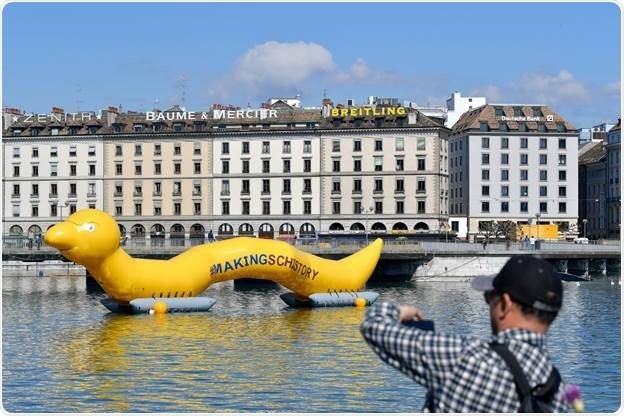Experts gather at Neglected Tropical Diseases Summit to demand more global action to tackle one of the world’s biggest killers - schistosomiasis.

A giant worm on Lake Geneva representing the parasitic worm of schistosomiasis that causes suffering to millions around the world. It’s devastating impact is second only to malaria.
On the eve of the Neglected Tropical Diseases (NTD) Summit in Geneva, Switzerland, the Global Schistosomiasis Alliance (GSA) has unveiled a giant worm on Lake Geneva. The 25m structure represents the parasitic worm of schistosomiasis that causes significant suffering and death.
Aiming to generate global attention, the GSA is calling for more concerted action to eliminate this disease. Hundreds of millions of people around the world are at risk of schistosomiasis: a silent water borne killer that lurks in freshwater lakes and rivers.
“Schistosomiasis is the biggest killer you’ve probably never heard of, and that’s the problem. We want to bring the suffering that this disease causes to the attention of the world and policy makers as more awareness will lead to greater action.
The giant worm on Lake Geneva is part of the #MakingSchistory global awareness campaign. We want to make history and consign schistosomiasis to the past. Together with our partners, the GSA is determined to cut the cycle of transmission & eliminate schistosomiasis,” said Dr Johannes Waltz, Global Schistosomiasis Alliance.
The call for more global action to tackle schistosomiasis has been put into focus this year as the Merck-World Health Organization medicine donation programme marks its tenth year. This programme provides free praziquantel to children in Africa. To date 100 million children have been treated.
We are confident that elimination of schistosomiasis is possible. We have made a lot of progress in the last 15 years but we need to do more.
The availability of free treatment has enabled us to break the cycle of misery caused by schistosomiasis, improve the health of a generation of school aged children and protect them from the serious consequences of infection. The next steps will be to provide clean water and better sanitation which are needed to stop the suffering completely,”
Professor Alan Fenwick, Professor of Tropical Parasitology, Imperial College London and Founder, Schistosomiasis Control Initiative.
Schistosomiasis kills 280,000 people every year in Africa alone. People can become infected with schistosomiasis when they come into contact with contaminated water while washing, playing or working. Infection is especially high in children and can cause anaemia, stomach pain and swelling, diarrhoea, bladder cancer as well as holding back their cognitive development and growth.